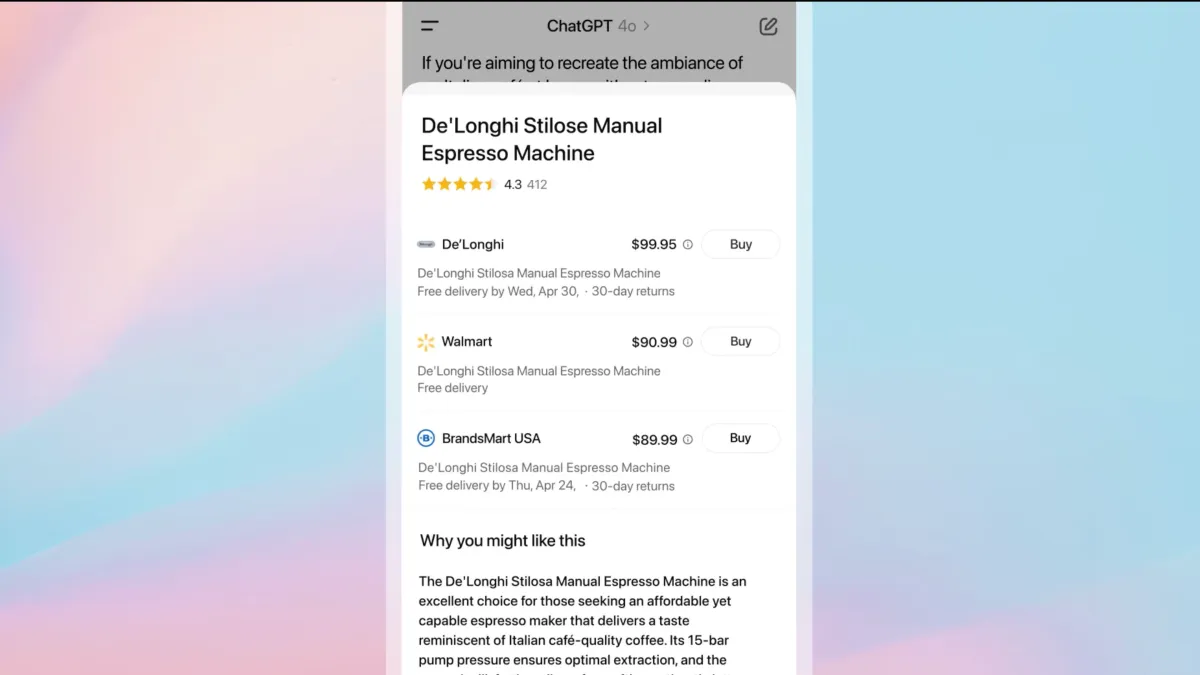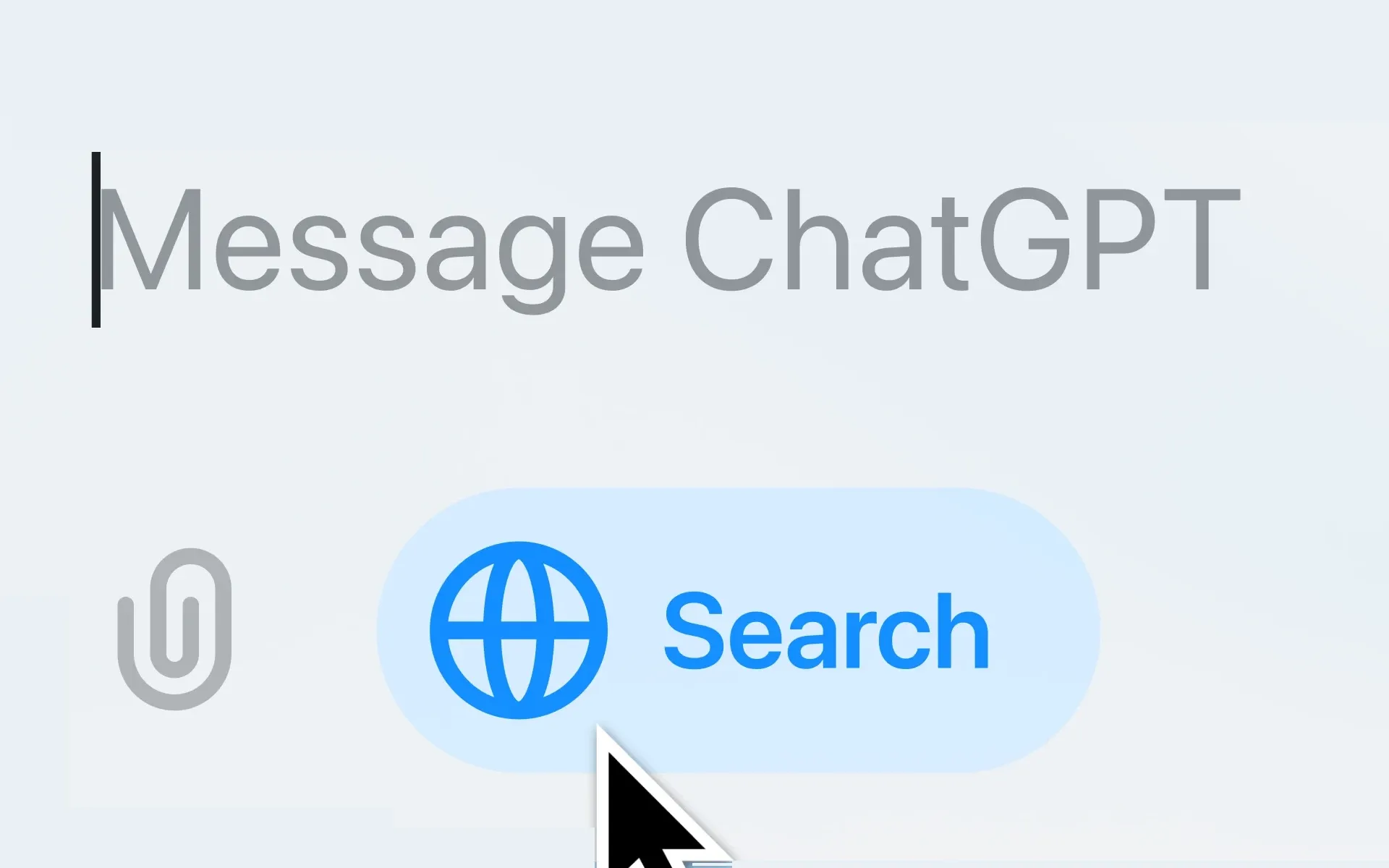
OpenAI has announced significant enhancements to ChatGPT's search functionality, including new shopping features that allow users to find, compare, and purchase products directly through the platform. The announcement comes amid rapid adoption of ChatGPT's search capabilities, with the company reporting over 1 billion web searches conducted through the platform in just the past week.
Get the PPC Land newsletter ✉️ for more like this
On April 28, 2025, just three days ago, OpenAI revealed several improvements to ChatGPT search, with shopping functionality beginning to roll out to Plus, Pro, Free, and logged-out users in all regions where ChatGPT is available.
The move represents a substantial expansion of ChatGPT's capabilities beyond conversational AI into territory traditionally dominated by dedicated search engines and e-commerce platforms.
New shopping features
The shopping improvements focus on making product discovery "simpler and faster" with three core enhancements:
- Improved product results
- Visual product details, pricing, and reviews
- Direct links to purchase
The new functionality activates when ChatGPT detects shopping intent in user queries. For example, when a user asks about costumes for dogs, ChatGPT displays relevant product options in "visually rich carousels," provides detailed product information, and links to websites where purchases can be made.
A distinguishing feature of ChatGPT's approach is that product results "are selected by ChatGPT independently and are not ads." This differs from traditional search engines where sponsored products often appear prominently in results.
How product selection works
ChatGPT determines which products to display through a multifaceted evaluation process. The system assesses user intent based on the query and available context, which may include user "memories" or custom instructions. It considers general factors like price, customer ratings, and ease of use, as well as specific criteria provided by the user, such as sizing preferences.
Previous user preferences may also influence product selection. For instance, if a user had previously indicated they dislike clown-themed items, ChatGPT might exclude clown costumes from results. Users can clarify their preferences to refine recommendations.
The product selection algorithm weighs several information sources, including:
- Structured metadata from third-party providers (e.g., price, product description) and other third-party content (e.g., reviews)
- Model responses generated by ChatGPT before considering new search results
- OpenAI safety standards
The importance of each factor varies based on user needs. If a user specifies a $30 budget, for instance, ChatGPT prioritizes price in its selection process. However, if price isn't mentioned as important, the system may emphasize other attributes.
OpenAI acknowledges the limitations of this system, noting that not all available products will necessarily appear in results, and recommends that users verify products meet their specific requirements before purchasing.
Product information display
To enhance readability and user experience, ChatGPT generates simplified product titles and descriptions based on information from third-party providers. This standardization addresses the inconsistency in how merchants describe identical products.
Product listings may include feature labels such as "Budget-friendly" or "Most popular." These labels are generated by ChatGPT based on available information, including third-party data. OpenAI emphasizes that these are not guarantees or verified statements and may not incorporate all market data. For example, a "Budget-friendly" label might indicate that reviewers frequently mention good value rather than signifying the lowest available price.
Review summaries synthesized by ChatGPT highlight common user opinions about products, drawing from reviews on public websites. Some listings may display star ratings and counts aggregated from third-party providers, though these might not match ratings on specific websites.
Pricing information and merchant selection
Price information comes from third-party providers. After clicking on a price, users may see additional pricing options from other merchants offering the same product.
The initial price shown typically reflects the first merchant listed, which "may not be the lowest available price."
OpenAI notes some limitations regarding pricing accuracy: Price updates from merchants may experience delays before appearing in ChatGPT, and estimated taxes and delivery fees might differ from final charges. The company is "actively working on faster methods to update this information."
When users click on products, ChatGPT may display a list of merchants. This list is generated based on merchant and product metadata from third-party providers. Currently, the display order is "predominantly determined by these providers" rather than being ranked by factors like price or shipping policies.
Looking ahead, OpenAI is exploring direct product feed integration with merchants to ensure "more accurate and current listings." Interested merchants can complete an interest form to be notified when submissions open.
Additional search enhancements
Beyond shopping, OpenAI announced several other improvements to ChatGPT's search functionality:
- WhatsApp integration: Users can now send messages to ChatGPT via WhatsApp at 1-800-ChatGPT (+1-800-242-8478) to get current information and live sports scores. This service is available in all regions where ChatGPT operates.
- Improved citations: ChatGPT now supports multiple citations for responses, enabling users to verify information across various sources. A new 'highlight' user interface clearly indicates which parts of answers are associated with specific citations.
- Search efficiency: Users can search more efficiently with trending searches and autocomplete suggestions.
Technical implementation details
ChatGPT search is available to all ChatGPT Free, Plus, Team, Edu, and Enterprise users, as well as free users who are logged out. The service can be accessed via chatgpt.com and through desktop and mobile applications.
 PPC LandLuís Rijo
PPC LandLuís Rijo
The system allows users to "get fast, timely answers with links to relevant web sources, without needing to visit a separate search engine."
To improve search relevance, ChatGPT rewrites user queries into more targeted search terms. For instance, a biotech researcher asking about CCR8 drug development might see their query transformed into "CCR8 immunotherapy drug development 2025" and potentially additional follow-up queries like "CHS-114 conference 2025."
The system also collects general location information from IP addresses to enhance search accuracy, which may be shared with third-party search providers. A query about nearby restaurants might be reformulated as "top restaurants San Francisco" if the user's IP indicates that location. OpenAI states that it does not share IP addresses or ChatGPT account information with these providers.
Search providers currently include Bing (Microsoft).
To access search functionality, users can visit chatgpt.com and select 'View all tools,' then choose the 'Search' icon. Alternatively, they can use the "/" shortcut and select Search from the pop-up menu. The system can also automatically search the web when questions might benefit from online information.
For users seeking even deeper integration, ChatGPT can be set as the default search engine in Chrome through an extension. This configures the browser to redirect URL bar searches to ChatGPT.
Market impact and analysis
The introduction of shopping features to ChatGPT represents a strategic move into territory dominated by major e-commerce and search players like Amazon and Google. By processing over 1 billion weekly searches already, OpenAI has demonstrated rapid user adoption of ChatGPT as a search alternative.
For the marketing community, these developments have several significant implications:
- New discovery channel: Brands must now consider ChatGPT as an emerging product discovery platform, requiring optimization strategies similar to those used for traditional search engines.
- Different ranking factors: Unlike ad-based systems, ChatGPT's product selection algorithm emphasizes factors like customer ratings, price competitiveness, and alignment with specific user preferences. Marketers may need to reformulate their strategies to perform well in this environment.
- Visual merchandising changes: The "visually rich carousels" require rethinking product presentation, with an emphasis on clear, standardized product descriptions and high-quality images.
- First-party data importance: ChatGPT's intention to develop direct merchant integration highlights the growing value of first-party product data feeds and accurate, up-to-date product information.
- Consumer behavior shifts: As AI platforms increasingly mediate shopping decisions, consumer behavior may evolve toward more intention-based purchasing rather than browsing-based discovery.
The non-advertising approach is particularly noteworthy. While traditional search engines and e-commerce platforms generate revenue through sponsored placements, OpenAI appears to be prioritizing user experience with independently selected results. This could pressure established players to reconsider the balance between advertising and user experience in their own platforms.
Timeline
- April 28, 2025: OpenAI announces ChatGPT search improvements and shopping features, reporting over 1 billion weekly searches
- April 28, 2025: Rollout begins for shopping features to Plus, Pro, Free, and logged-out users globally
- April 28, 2025: Additional enhancements announced including WhatsApp integration, improved citations, and search efficiency features
- May 1, 2025: Rollout continues, expected to take "a few days to complete" according to OpenAI

